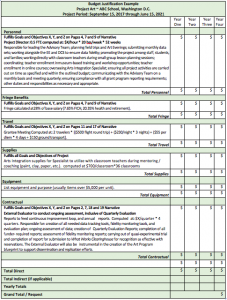by Resource Associates @ grantwriters.net
Grant Questions? Let’s talk. info@grantwriters.net 505-326-4245
Have you ever read the last page of a novel first? Not ideal when reading a thriller – but brilliant if you’re a grant writer. Many reviewers will approach a grant proposal “backward,” by reading the budget and logic model first. This offers a snapshot of your project before they dive into the bones of the narrative, which leads us to:
Tip #1: Your Budget Should Stand on Its Own.
When a reviewer reads the budget for your project, they should be able to understand Who, When, Where, and How. This is accomplished by creating a tight, descriptive, easy-to-follow narrative alongside your figures to explain the details. Just as an abstract is a synopsis of your project, your budget should be as well. Your budget should tell a story.
When? The time period for your project. Be sure to place the dates in the header of your budget and include separate columns for each year.
Who? Who is participating in your project? What is their part? Include roles, responsibilities and expenses for your organization, staff, partners and consultants.
Where? List the location(s) for your project. Include your office(s), project sites, partner locations, rentals for conferences, travel, etc. How are these sites relevant to the project?
How? What will you need to carry out the project and how will you do it? Include Direct Expenses (supplies, equipment, office expenses, transportation, curriculum, etc. directly relating to this specific project), and Indirect Expenses, if appropriate (expenses not justified as part of the project, yet expenses that must be incurred to operate your organization, such as rent, utilities and insurance — usually from 3% to 10%). Make sure you break down the expenses as well.
A brilliant budget will be comprehensive, yet easy to read. This leads us to:
Tip #2: Keep it Simple.
If the funder supplies a budget template, use it — don’t recreate the wheel. If they offer specific guidelines for the budget, follow them. However, if the options are open, keep it simple (the key is brevity; less is more). Why create a ten-page budget when you can do it in half the space — or even just one page? Reviewers will love you for it. For example, let’s say your project will last over a period of four years, and many of the expenses are the same or similar over the course of those four years. Instead of creating a separate, redundant budget for each year (this will likely take up several pages for each year), use the one page / five column approach. The first column for descriptions, and the remaining four columns representing the figures / expenses for each year (see example below). This won’t always be possible, especially if each year of your project has drastically different activities. However, it’s always beneficial to cut out the fluff and repetition that can confuse and distract. Your budget should answer questions, not create them. This leads us to:
Tip #3: Directly Tie your Goals and Objectives into Your Budget.
An exceptional budget will weave the goals and objectives from the project narrative into the budget narrative. This creates a streamlined and professional blueprint for your entire project. Provide clear, direct and appropriate goals and objectives. They should sync exactly with your project narrative and will serve as confirmation that you know what you’re doing – that you’re qualified to lead and administer a complicated project. Also, try to always keep the brunt of your project’s nuts-and-bolts base expenses in Year One. Don’t make it contingent upon subsequent years because funding may turn out to only be available for the first year. If a reviewer sees that you rely too heavily on the future for the implementation of your core project, they may pass you over for another.
Below is a brief example of how to create a narrative within your budget. Categories with more than one expense should get their own individual line item and explanation. This table will give you an idea on how to approach each category.
Download a PDF of the grant budget sample for a closer look.
The budget is a critical part of a grant proposal, and critical to your project success. To improve your chances of being awarded a grant, think through all the details of your budget and present them clearly and concisely in your grant proposal. For more tips on writing a grant proposal, watch this webinar. And remember the grant writing experts at Resource Associates are available to provide a technical review of your grant proposals before you submit them to help give you the best chance for success.







